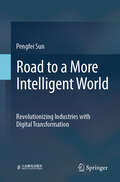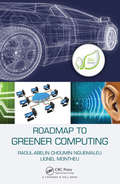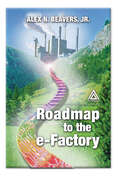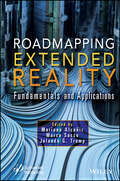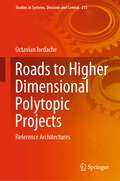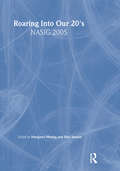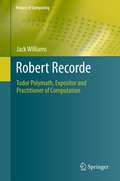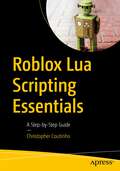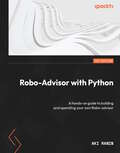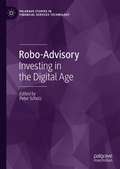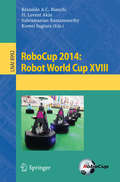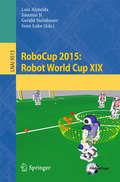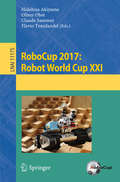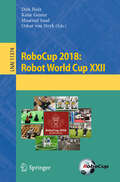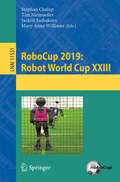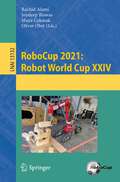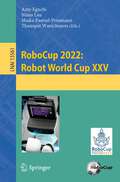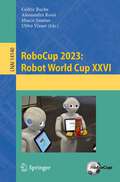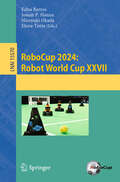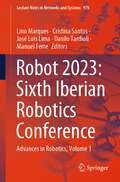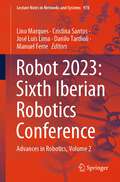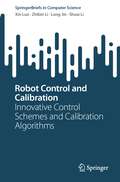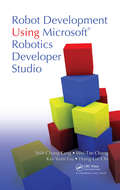- Table View
- List View
Road to a More Intelligent World: Revolutionizing Industries with Digital Transformation
by Pengfei SunThis book provides an in-depth look at the current development of the fifth-generation mobile communication technology (5G) and artificial intelligence (AI), their technological advantages, application, and critical role in science and technology, as well as their future development trends. This book is divided into three parts. The first part details the current development of 5G around the globe and the evolution from 5G to 5.5G. The second part explores the significant developments in AI technologies, including typical AI technologies such as machine learning (ML), natural language processing (NLP), and computer vision (CV), and the popular foundation model technologies. The third part looks at the impacts of 5G+AI on the digitalization and intelligent development of industries and showcases some of the applications in government, meteorology, education, and healthcare, etc. This book can serve as a reference for a diverse range of readers, such as people in the public sector and the mobile communications industry, and faculty and students in this field.
Roadmap to Greener Computing
by Raoul-Abelin Choumin Nguemaleu Lionel MontheuAs computers become faster, use more energy, and older models become obsolete more quickly, the question is often asked: What can the engineering and computer science community do to make computing greener? Roadmap to Greener Computing defines the challenges involved in making computing more environmentally friendly and includes methods and techniq
Roadmap to the E-Factory
by Jr., Alex BeaversAs manufacturing control systems converge with manufacturing automation systems and systems supporting the back office, IT managers in manufacturing companies are being asked to oversee all their company's IT-including the manufacturing systems. Roadmap to the E-Factory explains what the IT manager needs to know about these unfamiliar systems. It discusses the information value chain, a concept which demonstrates how all computing resources contribute to the success of a manufacturing organization. The material also demonstrates the strategic value of IT, and it includes recommendations for managing the computing resources of a global manufacturing enterprise. An authoritative text on IT, manufacturing, and control systems, Roadmap to the E-Factory provides detailed information on: e-companies e-commerce o Lean manufacturing Supply chain management ERP Operations Emerging trends In addition to helping you gain a basic understanding of manufacturing systems, Roadmap to the E-Factory shows you how IT systems can most effectively support these systems and provides you with a set of recommendations that enables you to derive maximum benefit from them.
Roadmapping Extended Reality: Fundamentals and Applications
by Mariano Alcañiz Jolanda G. Tromp Marco SaccoROADMAPPING EXTENDED REALITY This book offers a comprehensive overview of the technological aspects of Extended Realities (XR) and discusses the main challenges and future directions in the field. This book is important and timely – XR technologies have overcome the 3 main aspects that were holding it back from mainstream adoption: cost, cables, and size. However, there are many aspects of XR technologies that are now going to be explored and developed that still need urgent research in terms of security, privacy, health and safety, long-term effects, addiction risks, and age-related developmental concerns, and the aim of the book is to inform all readers of these open issues and challenges. There are currently a great number of interdisciplinary researchers and developers working in the XR R&D field. Recently, XR technologies moved from the Gartner Hype Cycle onto the Plateau of Productivity on the Gartner Hype Cycle signaling that the fundamental XR technologies are now deemed mature technologies and ready for deployment in a wide variety of application areas. Corroborated by the fact that XR technologies are part of the future Metaverse, a concept that went rapidly mainstream during the time of writing of this book. Roadmapping Extended Reality is divided into two parts: (1) fundamentals and (2) applications. The first part covers the main technological aspects of XR. The chapters in this section review and discuss relevant fundamental concepts of XR, the actual state-of-the-art, and future challenges. The second part of the book focuses on covering a wide range of applications of XR including a future roadmap. All in all, the book offers a snapshot of the state-of-the-art in XR and addresses the needs of a multidisciplinary audience working in both academia and the industry, as well as stakeholders at government agencies and non-profit organizations. Audience This book is aimed at academic and industrial developers, exploring and developing applications in the XR, VR, AR, AI, smart IoT, 4th Industrial Revolution space, including those that are solving technology requirements, human factors, evaluation methodology advances, and ROI investigations.
Roads to Higher Dimensional Polytopic Projects: Reference Architectures (Studies in Systems, Decision and Control #215)
by Octavian IordacheHigh dimensional reference architectures presented here allows confronting and prevailing over the growing complexity of polytopic projects implementations.Such projects should be envisaged giving that conventional systems operations, equipments, methodologies or organizations will reach their limits for self-evolvability in high complexity conditions. Self-evolvable high complexity systems are based on high dimensional polytopic reference architectures.Polytope is the general term of the sequence: point, line, polygon, polyhedron and so on.The polytopic projects are targeting the artificiality, not only for materials where it is well known and applied, but also for biological, cognitive, intelligent and mathematical systems. The book highlights the polytopic projects basic similarity despite the noticeable difference as domains of application. The roads to follow and the algebra of changing roads are emphasized.The book is divided in 9 chapters. Chapter 1 introduces the Polytopic Roadmap to 4D and beyond. The role for the dialogue of processes in duality of the non-Aristotelian Logic of Contradiction and of Included Middle is emphasized for different domains. Chapter 2 refers to chemical systems. Supramolecular chemistry, metal organic frameworks, MOF, and reaction networks, are the examples considered in the frame of polytopic chemistry. Chapter 3 refers to biological systems. Biological dynamical hierarchies and quasi-species are the considered case studies. Technological and scientific projects targeting artificiality for cells and viruses are considered. Chapter 4 refers to cognitive systems. Developmental stages, formal and relational concepts analysis, and neural coding are considered here. The roles of the 4D systems of systems of systems and of conceptual 4D-cube are emphasized. Artificiality for cognitive systems is the object of study.Chapter 5 refers to mathematical systems. Modeling levels and the 4D digital twins are discussed. Hopf monoids as tools for the study of combinations and separations, dual graded graphs and V-models are informally presented. Chapter 6 refers to application of formal concept analysis, FCA, for high dimensional separations, nesting and drug delivery. Chapter 7 refers to polytopic engineering systems as multiscale transfer, distributors-collectors, cyclic operations, middle vessel columns, mixing, assembly and designs. Equipments have been characterized using Polytopic Roadmaps and classified by Periodic Tables. Chapter 8 introduces polytopic industry, economy, society and sustainability. Chapter 9 outlines new domains of interest as arts and architecture, transdisciplinarity, complex systems and unity of sciences and engineering.Polytopic Roadmaps are proposed as Method for experts from various fields to synthesize their thinking and capabilities into new projects implementation to face and surpass high complexity. A repetitive finding of this book is that self-evolvability observed in physical systems is based on the same directed sequence of reference architectures as the self-evolvability of concepts in our mind. Continuing to develop the field of self-evolvable systems and presenting the polytopic roadmaps for 4D and beyond advances in ever growing complexity domains, the book will be useful to engineers, researchers, entrepreneurs and students in different branches of production, complex systems sciences and engineering, ecology and applied mathematics.
Roaring Into Our 20's: NASIG 2005
by Margaret MeringThought-provoking perspectives from experts in library serials!Roaring Into Our 20&’s: NASIG 2005 presents leading authorities in library serials providing their unique perspectives on the challenges of serials collection development and management, as well as their promising visions for the future. Marshall Keys, Regina Romano Reynolds, Steve Shadle, Carol Hixson, Paul Weiss, and a host of other top experts in serials gathered as presenters for the milestone twentieth anniversary conference of the North American Serials Interest Group (NASIG) held in May 2005 in Minneapolis, Minnesota. The latest issues and thought-provoking strategies are explored, giving librarians of all types a firm grasp of the newest products and most effective tactics to best manage serials today-and tomorrow.The conference itself consisted of preconference programs, vision sessions, strategy sessions, and tactics sessions not only to provide goals for the future, but also to examine ways to help librarians become more effective in handling the constantly evolving challenges of serial management. Roaring Into Our 20&’s: NASIG 2005 discusses a broad selection of topics of crucial interest, including electronic resources, vendors, financial issues, the development of new products and services and other topics exploring the bright and challenging future of library serials. Several chapters include tables and figures to enhance the clarity of ideas.Topics in Roaring Into Our 20&’s: NASIG 2005 include: FRBR (Functional Requirements for Bibliographic Records) ISSN revision cross-provider search institutional depositories e-journal management OpenURL Big Deals cancellation projects RSS the AACR3 development processRoaring Into Our 20&’s: NASIG 2005 is a horizon-expanding collection that is perfect for librarians, publishers, and commercials vendors interested in the future of serial publication.
Robert Recorde: Tudor Polymath, Expositor and Practitioner of Computation
by Jack WilliamsThe 16th-Century intellectual Robert Recorde is chiefly remembered for introducing the equals sign into algebra, yet the greater significance and broader scope of his work is often overlooked. This book presents an authoritative and in-depth analysis of the man, his achievements and his historical importance. This scholarly yet accessible work examines the latest evidence on all aspects of Recorde's life, throwing new light on a character deserving of greater recognition. Topics and features: presents a concise chronology of Recorde's life; examines his published works; describes Recorde's professional activities in the minting of money and the mining of silver, as well as his dispute with William Herbert, Earl of Pembroke; investigates Recorde's work as a physician, his linguistic and antiquarian interests, and his religious beliefs; discusses the influence of Recorde's publisher, Reyner Wolfe, in his life; reviews his legacy to 17th-Century science, and to modern computer science and mathematics.
Robin Williams Design Workshop (2nd Edition)
by Robin Williams John TollettLearn design theory and practical know-how from the award-winning author/design team, Robin Williams and John Tollett! Robin Williams introduced design and typographic principles to legions of readers with her best-selling Non-Designer's book series. Now she and designer/co-author John Tollett take you to the next level of creative design with practical advice and lessons in composition, visual impact, and design challenges. Presented in Robin and John's signature style--writing that is so crystal clear, it's accessible to absolutely anyone--and illustrated with hundreds of full-color design examples, the ideas in this book tackle design theory, visual puns, and layout and graphics strategies for real-world projects. Developing designers will appreciate the authors' imaginative approach and well-chosen examples. Discover practical and effective design principles and concepts--and how to apply them to virtually any project. Learn why some designs are attention-getting and others are not. Learn how to choose just the right look--corporate or casual, classic or trendy--for specific types of projects, such as business cards, letterhead and envelopes, newsletters and brochures, logos, advertising, and more. Test your design acumen by comparing before-and-after examples. Find a wealth of inspiration for your own design projects. Gain insight into the design process by studying the work of guest designers, who offer their personal commentary and insights.
Roblox Lua Scripting Essentials: A Step-by-Step Guide
by Christopher CoutinhoEmbark on a transformative journey through the exciting world of Roblox Lua scripting with this comprehensive hands-on guide. Tailored to game developers, both seasoned and new, this book serves as your roadmap to mastering the art and science of Lua scripting within the dynamic Roblox Studio environment.You'll explore a wide spectrum of foundational concepts, including variables, functions, loops, tables, arrays, and more. Delve into advanced topics like raycasting, object-oriented programming with humanoids, and intricate leaderboard systems. Each chapter is crafted with real-world examples and step-by-step tutorials, empowering you to create engaging and interactive gameplay experiences.You'll gain profound insights into modularization, efficient coding practices, and techniques to optimize your scripts, paving the way to elevate your game development to an entirely new plane of creativity and complexity. You'll also discover sophisticated scripting concepts, such as custom events, and client-server communication. Invest in your future as a Roblox developer today, and let this book be your guide to crafting extraordinary gaming experiences. Roblox Lua Scripting Essentials provides the insight, tools, and guidance needed to shape your unique path in this thrilling domain of game development. What You'll Learn Wield variables, functions, loops, conditionals, arrays, and more to create dynamic gameplay elementsExplore the principles of object-oriented programming, and modularization techniques to develop clean, efficient, and organized codeUnderstand the complex client-server relationships, custom events, and multiplayer functionalities that bring games to lifeDiscover the power of modular coding, enabling you to create more organized and maintainable code basesLay down a robust foundation in Lua scripting for Roblox Who This Book Is For This book is meticulously crafted to serve a diverse array of readers, ranging from complete beginners to intermediate developers.
Roblox la Guía no Oficial
by The Yuw Ángel Martínez Terré* GUÍA NO OFICIAL * Trucos avanzados y guía de estrategia. Esta es la guía más exhaustiva y detallada que encontrarás online. Disponible en descarga instantánea en tu teléfono móvil, eBook o en forma física. Dado el éxito de mis otros cientos de guías he escrito otra para usuarios más avanzados. Entra en detalle sobre las estrategias a seeguir para vencer a tu oponente, progresar en el juego, obtener más monedas y mucho más. -Consejos y estrategias profesionales. -Trucos. -Secretos, consejos, trampas, desbloqueables y otros ardides usados por los jugadores profesionales. -Cómo obtener un montón de dinero. -Y MUCHO MÁS Todas las versiones de esta guía cuentan con capturas de pantalla para ayudarte a entender mejor el juego. No hay otra guía mejor y más avanzada que esta. Advertencia: Este producto no está asociado, afiliado, apoyado, certificado o respaldado por el autor Original.
Robo-Advisor with Python: A hands-on guide to building and operating your own Robo-advisor
by Aki RaninBuild your own robo-advisor in Python to manage your investments and get up and running in no timePurchase of the print or Kindle book includes a free PDF eBookKey FeaturesExplore the use cases, workflow, and features that make up robo-advisorsLearn how to build core robo-advisor capabilities for goals, risk questions, portfolios, and projectionsDiscover how to operate the automated processes of a built and deployed robo-advisorBook DescriptionRobo-advisors are becoming table stakes for the wealth management industry across all segments, from retail to high-net-worth investors. Robo-advisors enable you to manage your own portfolios and financial institutions to create automated platforms for effective digital wealth management. This book is your hands-on guide to understanding how Robo-advisors work, and how to build one efficiently. The chapters are designed in a way to help you get a comprehensive grasp of what Robo-advisors do and how they are structured with an end-to-end workflow. You'll begin by learning about the key decisions that influence the building of a Robo-advisor, along with considerations on building and licensing a platform. As you advance, you'll find out how to build all the core capabilities of a Robo-advisor using Python, including goals, risk questionnaires, portfolios, and projections. The book also shows you how to create orders, as well as open accounts and perform KYC verification for transacting. Finally, you'll be able to implement capabilities such as performance reporting and rebalancing for operating a Robo-advisor with ease. By the end of this book, you'll have gained a solid understanding of how Robo-advisors work and be well on your way to building one for yourself or your business.What you will learnExplore what Robo-advisors do and why they existCreate a workflow to design and build a Robo-advisor from the bottom upBuild and license Robo-advisors using different approachesOpen and fund accounts, complete KYC verification, and manage ordersBuild Robo-advisor features for goals, projections, portfolios, and moreOperate a Robo-advisor with P&L, rebalancing, and fee managementWho this book is forIf you are a finance professional or a data professional working in wealth management and are curious about how robo-advisors work, this book is for you. It will be helpful to have a basic understanding of Python and investing concepts. This is a great handbook for developers interested in building their own robo-advisor to manage personal investments or build a platform for their business to operate, as well as for product managers and business leaders in financial services looking to lease, buy, or build a robo-advisor.
Robo-Advisory: Investing in the Digital Age (Palgrave Studies in Financial Services Technology)
by Peter ScholzRobo-Advisory is a field that has gained momentum over recent years, propelled by the increasing digitalization and automation of global financial markets. More and more money has been flowing into automated advisory, raising essential questions regarding the foundations, mechanics, and performance of such solutions. However, a comprehensive summary taking stock of this new solution at the intersection of finance and technology with consideration for both aspects of theory and implementation has so far been wanting. This book offers such a summary, providing unique insights into the state of Robo-Advisory. Drawing on a pool of expert authors from within the field, this edited collection aims at being the vital go-to resource for academics, students, policy-makers, and practitioners alike wishing to engage with the topic. Split into four parts, the book begins with a survey of academic literature and its key insights paired with an analysis of market developments in Robo-Advisory thus far. The second part tackles specific questions of implementation, which are complemented by practical case studies in Part III. Finally, the fourth part looks ahead to the future, addressing questions of key importance such as artificial intelligence, big data, and social networks. Thereby, this timely book conveys both a comprehensive grasp of the status-quo as well as a guiding outlook onto future trends and developments within the field.
RoboCup 2014: Robot World Cup XVIII
by H. Levent Akin Reinaldo A. C. Bianchi Subramanian Ramamoorthy Komei SugiuraThis book includes the thoroughly refereed proceedings of the 18th Annual RoboCup International Symposium, held in Joao Pessoa, Brazil, in July 2014. The 36 revised papers were carefully reviewed and selected from 66 submissions and include 11 champion-team papers, three special-track papers on open-source hardware and software, nine papers on the advancement of the RoboCup leagues track, and three best papers. The contributions present current research and educational activities in the field of robotics and artificial intelligence with a special focus on the interaction between robots and humans.
RoboCup 2015: Robot World Cup XIX (Lecture Notes in Computer Science #9513)
by Luis Almeida Jianmin Ji Gerald Steinbauer Sean LukeThis book is the Proceedings of the 19th Annual RoboCup International Symposium, held in Hefei, China, in July 2015.The book contains 20 papers presented at the Symposium, carefully selected from 39 submissions. Additionally the book contains 11 champion team papers and one paper from the Workshop on Benchmarking Service Robots. The papers present current research in robotics, artificial intelligence, computer vision, multiagent systems, simulation, and other areas.
RoboCup 2017: Robot World Cup XXI (Lecture Notes in Computer Science #11175)
by Claude Sammut Hidehisa Akiyama Oliver Obst Flavio TonidandelThis book includes the post-conference proceedings of the 21st RoboCup International Symposium, held in Nagoya, Japan, in September 2017. The 33 full revised papers and 9 papers from the winning teams presented were carefully reviewed and selected from 58 submissions. The papers are orginazed on topical sections on Robotics, Artificial intelligence, Environment perception, State estimation and much more.
RoboCup 2018: Robot World Cup XXII (Lecture Notes in Computer Science #11374)
by Dirk Holz Katie Genter Maarouf Saad Oskar Von StrykThis book includes the post-conference proceedings of the 22nd RoboCup International Symposium, held in Montreal, QC, Canada, in June 2018. The 32 full revised papers and 11 papers from the winning teams presented were carefully reviewed and selected from 51 submissions. This book highlights the approaches of champion teams from the competitions and documents the proceedings of the 22nd annual RoboCup International Symposium. Due to the complex research challenges set by the RoboCup initiative, the RoboCup International Symposium offers a unique perspective for exploring scientific and engineering principles underlying advanced robotic and AI systems.
RoboCup 2019: Robot World Cup XXIII (Lecture Notes in Computer Science #11531)
by Mary-Anne Williams Stephan Chalup Tim Niemueller Jackrit SuthakornThis book includes the post-conference proceedings of the 23rd RoboCup International Symposium, held in Sydney, NSW, Australia, in July 2019. The 38 full revised papers and 14 invited papers presented in this book were carefully reviewed and selected from 74 submissions. This book highlights the approaches of champion teams from the competitions and documents the proceedings of the 23rd annual RoboCup International Symposium. Due to the complex research challenges set by the RoboCup initiative, the RoboCup International Symposium offers a unique perspective for exploring scientific and engineering principles underlying advanced robotic and AI systems.
RoboCup 2021: Robot World Cup XXIV (Lecture Notes in Computer Science #13132)
by Oliver Obst Rachid Alami Joydeep Biswas Maya CakmakThis book constitutes the proceedings of the 24th RoboCup International Symposium which was held online during June 22 - June 28, 2021.The 19 full papers included in these proceedings were carefully reviewed and selected from 42 submissions; the volume also includes 10 RoboCup Champions Papers. In addition to presenting the proceedings of the RoboCup 2021 Symposium, the book highlights the approaches of champion teams from the competitions. Due to the complex research challenges set by the RoboCup initiative, the RoboCup International Symposium offers a unique perspective for exploring scientific and engineering principles underlying advanced robotic and AI systems.
RoboCup 2022: Robot World Cup XXV (Lecture Notes in Computer Science #13561)
by Nuno Lau Amy Eguchi Maike Paetzel-Prüsmann Thanapat WanichanonThis book constitutes the proceedings of the 25th RoboCup International Symposium which was held online during July 2022 in Bangkok, Thailand. The 28 full papers included in these proceedings were carefully reviewed and selected from 40 submissions; the volume includes 12 papers from the winners of the RoboCup 2022 competitions under the Champions Track. The RoboCup International Symposium focuses on the science behind the advances in robotics, including the key innovations that led the winning teams to their success, and the outcomes of research inspired by challenges across the different leagues at RoboCup.
RoboCup 2023: Robot World Cup XXVI (Lecture Notes in Computer Science #14140)
by Ubbo Visser Cédric Buche Alessandra Rossi Marco SimõesThis book constitutes the proceedings of the 26th RoboCup International Symposium which was held in Bordeaux, France, during July 4-10, 2023. The 25 regular papers included in these proceedings were carefully reviewed and selected from 47 submissions; the volume also includes 11 RoboCup Champions Papers. In addition to presenting the proceedings of the RoboCup 2023 Symposium, the book highlights the approaches of champion teams from the competitions. Due to the complex research challenges set by the RoboCup initiative, the RoboCup International Symposium offers a unique perspective for exploring scientific and engineering principles underlying advanced robotic and AI systems.
RoboCup 2024: Robot World Cup XXVII (Lecture Notes in Computer Science #15570)
by Elena Torta Edna Barros Josiah P. Hanna Hiroyuki OkadaThis book constitutes the proceedings of the 27th RoboCup International Symposium which was held in Eindhoven, The Netherlands, during July 15-22, 2024.The 34 regular papers included in these proceedings were carefully reviewed and selected from 58 submissions.The technical challenges brought on by the RoboCup initiative motivate novel scienti c and engineering strategies for developing complete, advanced robotic systems. The RoboCup Symposium fosters the sharing of these approaches and advances the science of robotics by enabling building upon the progress of others. This book also presents contributed technical papers from the champions of the 2024 competition's constituent leagues. These papers describe the key approaches necessary for winning the respective competition.
Robot 2023: Advances in Robotics, Volume 1 (Lecture Notes in Networks and Systems #976)
by Manuel Ferre José Luís Lima Danilo Tardioli Cristina Santos Lino MarquesThis text will be replaced by the correct backcovertext / informationtext as soon as we get it.
Robot 2023: Advances in Robotics, Volume 2 (Lecture Notes in Networks and Systems #978)
by Manuel Ferre José Luís Lima Danilo Tardioli Cristina Santos Lino MarquesThis book contains a selection of papers accepted for presentation and discussion at ROBOT2023, the Sixth Iberian Robotics Conference, held in the University of Coimbra, Coimbra, Portugal, during November 22nd-24th, 2023. ROBOT2023 is part of a series of conferences that are jointly organized by Sociedade Portuguesa de Robótica (SPR) / Portuguese Society for Robotics and by Sociedad Española para la Investigación y Desarrollo en Robótica (SEIDROB) / Spanish Society for Research and Development in Robotics. These conferences, now occurring with a yearly periodicity, provide a forum to roboticists mostly from Iberia, but also from other parts of the world, to present and discuss their research results, new developments, and applications in the field of Robotics. The volume 1 of this book contains 45 papers addressing fundamental aspects of mobile robotics and robot manipulation while volume 2 contains 45 papers covering the application of robotics in different domains and environments.
Robot Control and Calibration: Innovative Control Schemes and Calibration Algorithms (SpringerBriefs in Computer Science)
by Shuai Li Long Jin Xin Luo Zhibin LiThis book mainly shows readers how to calibrate and control robots. In this regard, it proposes three control schemes: an error-summation enhanced Newton algorithm for model predictive control; RNN for solving perturbed time-varying underdetermined linear systems; and a new joint-drift-free scheme aided with projected ZNN, which can effectively improve robot control accuracy. Moreover, the book develops four advanced algorithms for robot calibration – Levenberg-Marquarelt with diversified regularizations; improved covariance matrix adaptive evolution strategy; quadratic interpolated beetle antennae search algorithm; and a novel variable step-size Levenberg-Marquardt algorithm – which can effectively enhance robot positioning accuracy. In addition, it is exceedingly difficult for experts in other fields to conduct robot arm calibration studies without calibration data. Thus, this book provides a publicly available dataset to assist researchers from other fields in conducting calibration experiments and validating their ideas. The book also discusses six regularization schemes based on its robot error models, i.e., L1, L2, dropout, elastic, log, and swish. Robots’ positioning accuracy is significantly improved after calibration. Using the control and calibration methods developed here, readers will be ready to conduct their own research and experiments.
Robot Development Using Microsoft Robotics Developer Studio
by Shih-Chung Kang Wei-Tze Chang Kai-Yuan Gu Hung-Lin ChiThe Microsoft Robotics Developer Studio (MSRDS) and LEGO robots together offer a flexible platform for creating robotic systems. Designed for novices with basic programming skills, Robot Development Using Microsoft Robotics Developer Studio provides clear instructions on developing and operating robots. It includes an extensive array of examples, w
